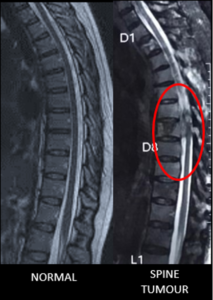 A spinal tumor or cancer is the growth of cells (mass) in or surrounding the spinal cord. The primary cause of spinal tumors is unknown. Some primary spinal tumors occur with genetic defects. Whereas extradural tumors are mostly metastases from primary cancers elsewhere most commonly from the breast, lung cancer, and prostate
A spinal tumor or cancer is the growth of cells (mass) in or surrounding the spinal cord. The primary cause of spinal tumors is unknown. Some primary spinal tumors occur with genetic defects. Whereas extradural tumors are mostly metastases from primary cancers elsewhere most commonly from the breast, lung cancer, and prostate
SPINAL TUMORS CAN OCCUR:
- Inside the spinal cord (intramedullary)
- In the membranes (meninges) covering the spinal cord (extramedullary – intradural)
- Between the meninges and bones of the spine (extradural), tumors may extend from other locations cancer spreading to the bone then pushing into the cord (called epidural) but some cancers can spread directly into the cord area or directly into the cord itself
SYMPTOMS:
The tumor may press on the spinal cord or nerve roots, causing damage. The symptoms notice in patients are
- abnormal loss of sensations,
- severe back pain,
- urinary incontinence,
- muscular weakness of lower extremities,
- muscle contractions,
- loss of muscle function in some cases,
- rapid onset of paralysis.
TREATMENT:
In cases of spinal cord compression steroids (corticosteroids) injections can be administered as they tend to reduce inflammation and decrease volume of mass impinging on the spinal cord.
- Radiotherapy
- Surgical intervention incasesof histologic diagnosis, tumor local control or oncological cure, pain relief, spinal cord decompression and restoration of neurological function, restoration of spine stability, and deformity rectification
- Minimal Invasive Surgery in combination with Radiation or chemotherapy can be recommended in metastatic or primary tumors . In some of the cases direct decompressive surgery combined with postoperative radiotherapy provide better outcomes than treatment with radiotherapy alone for patients with spinal cord compression due to metastatic cancer.
